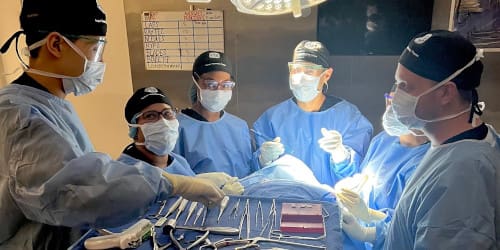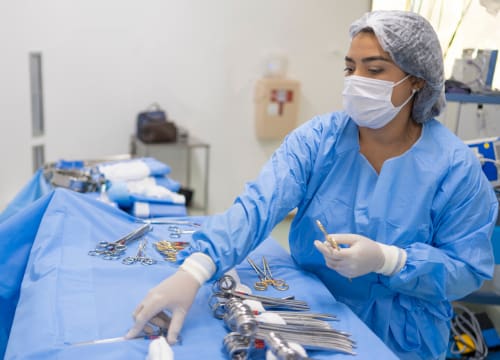When it comes to the operating room, precision is not just a skill, it’s a necessity. Every member of the surgical team must operate with unwavering focus, but for surgical technologists, attention to detail is at the heart of the profession. Their role requires a mastery of both technical knowledge and fine motor skills to ensure that surgeries are carried out safely, efficiently, and successfully.
It is common for surgical technician training to be centered around developing this precision from day one. Students learn not just how to perform the necessary tasks, but how to perform them flawlessly, consistently, and with a deep understanding of why every detail matters. In this post, we’ll explore why precision is so important, what’s involved in surgical technologist training, and how those considering this career can start preparing even before entering a program.
Why Precision Matters in Surgical Technology
In the high-stakes environment of the operating room, small mistakes can have serious consequences. Surgical technologists are responsible for setting up sterile fields, ensuring that instruments are correctly prepared, and assisting surgeons during procedures by anticipating their needs and providing the right tools at the right time. A single lapse in concentration, like handing over the wrong instrument or compromising the sterile field, can put a patient’s health at risk.
Attention to detail ensures patient safety, helps procedures run smoothly, and supports the entire surgical team. It’s not just about being careful; it’s about developing a mindset that prioritizes thoroughness, accountability, and proactive thinking at all times.
Precision Built Through Training
At CNI College, surgical technologist students undergo rigorous training that emphasizes precision at every stage. The program combines classroom instruction, hands-on labs, and clinical experiences to create a well-rounded education rooted in real-world application.
Here are some core components of training where precision is especially important:
1. Sterile Technique and Infection Control
One of the first skills students learn is how to create and maintain a sterile environment. This includes proper hand-washing techniques, gowning and gloving, preparing sterile fields, and recognizing breaches in sterility. Even the smallest error, like accidentally touching a non-sterile surface, requires immediate correction, a habit that must become second nature.
2. Instrument Identification and Handling
Surgical technologists must become intimately familiar with hundreds of instruments, many of which have subtle differences. Training involves learning not just the names and functions of each instrument, but also how to pass them to the surgeon efficiently and safely, often without being directly asked. Knowing the order of operations and anticipating needs requires sharp observation skills and deep technical knowledge.

3. Surgical Procedures and Protocols
Each type of surgery, whether orthopedic, cardiovascular, or neurosurgical, follows specific protocols. Students learn step-by-step how to prepare for different types of procedures, from setting up the operating room to understanding the sequence of surgical steps. Precision ensures that the correct supplies, tools, and equipment are ready and that nothing is overlooked.
4. Emergency Response and Problem Solving
Training also includes responding to unexpected situations, such as equipment malfunctions or sudden changes in a patient’s condition. Being able to stay calm under pressure, assess the situation quickly, and take precise action is critical for maintaining safety and efficiency.
How Precision Training Translates to a Career
Graduates of surgical technology programs carry their emphasis on precision into every aspect of their careers. In the field, surgical technologists:

- Prepare the operating room meticulously before each procedure.
- Perform instrument counts before, during, and after surgery to ensure that nothing is left inside the patient.
- Monitor the sterile field constantly, correcting any breaches immediately.
- Maintain accurate documentation related to the surgical procedure, patient data, and supply usage.
- Support the surgical team by anticipating needs, often without verbal communication, thanks to finely tuned observation and responsiveness.
This focus on precision builds trust among the surgical team and contributes directly to better patient outcomes. It also opens up career advancement opportunities, as experienced surgical technologists may specialize in specific areas (like cardiovascular or orthopedic surgery), become a Registered Nurse First Assistant, or move into leadership roles.
Preparing Now for a Career in Surgical Technology
If you’re interested in becoming a surgical technologist, there are several things you can start doing now to build the habits and skills needed for success in a surgical technology program, and in the profession itself.
1. Develop Strong Organizational Skills
The operating room demands organization. Start practicing by keeping your personal workspace clean, developing checklists for tasks, and paying attention to how you arrange your materials. Small habits now can translate to efficiency in the surgical setting later.
2. Practice Focus and Attention to Detail
Find ways to challenge your ability to maintain concentration over long periods. Activities like puzzles, model building, or even intricate crafts can help sharpen your focus and fine motor skills. Learn to double-check your work as a habit.
3. Learn Basic Medical Terminology
Familiarity with medical terms will give you a head start in your training. Free online resources, books, or introductory courses in medical terminology can help you start building your knowledge base.
4. Strengthen Communication Skills
Clear, calm communication is critical in the operating room. Practice listening carefully, speaking precisely, and working on your nonverbal communication skills. Team-based activities, such as sports or volunteer work, can help you hone these abilities.

5. Explore the Field
If possible, talk to surgical technologists, watch videos about surgeries (some hospitals and educational platforms offer insights), or read books about careers in healthcare. Understanding the demands of the field can help you mentally prepare for the level of responsibility and precision required.
Be Precise and Successful
The art of precision is what sets surgical technologists apart. It’s not just about knowing what to do, it’s about doing it consistently, correctly, and confidently, even under pressure. At CNI College, the Surgical Technology program is designed to build these critical skills from the ground up, preparing students for a career where every detail matters.
For those who are organized, focused, and passionate about helping others through healthcare, becoming a surgical technologist offers a rewarding path. And the journey starts now, with the small steps you take to sharpen your skills and commitment to excellence.

